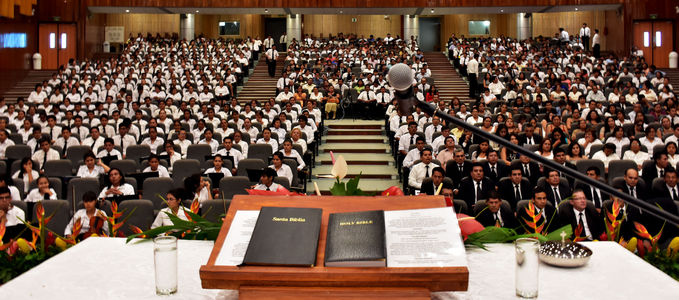
You have living Apostles? How can you be sure? It was the Chief Apostle himself who raised these questions. Decisive indications are found in a letter. Answers from a fascinating divine service.
What defines the apostolate? This is the topic Apostle Paul addresses in his letter to the church in Corinth. And this is the context from which the Bible text was taken for the divine service on 6 April 2016 in Pucallpa in Peru: “Clearly you are an epistle of Christ, ministered by us, written not with ink but by the Spirit of the living God, not on tablets of stone but on tablets of flesh, that is, of the heart” (2 Corinthians 3: 3).
The proof lies in the efficacy
“Why do you say you have living Apostles? Can you prove it? How can you be sure that they are true Apostles?” These are the questions the Chief Apostle raised at the beginning of his sermon. “The church, the congregation, the children of God … this is the proof that the Apostles are doing the work of Apostles.”
The mission of the Apostles is clear: “To proclaim the gospel of Jesus Christ.” And that means that God wants to help all people out of love and through His grace. “That is the God the Apostles teach us about.” But the teaching also has to become fully effective, he said.
“How can we assess the efficacy of the Apostle ministry?” The Chief Apostle mentioned three criteria in his sermon—always bearing in mind the fellowship of the faithful.
The first rule: love is the one and only reason
“Why do we follow Jesus?” he asked. Because we are afraid that we are going to be punished if we do not listen? Or because we hope to benefit through His divine blessing. “That would testify of a low level of knowledge and understanding,” he said.
Instead, what counts is: “We follow Christ because we love Him. We have discovered and felt His love, and that is why we love Him.” A good sign that the Apostles are true Apostles is when the congregation understands the love of Jesus Christ.
The second rule: growing in the nature of Jesus
Now somebody might say, “Yes, but that does not work. You are not really like Jesus.” – “ I know that,” the Chief Apostle said: “I know myself. I know how imperfect I am.” But what is important is not so much the current state, but the overall development that has been achieved. “For sure, we are not perfect. But we want to change. We want to become like Jesus Christ.”
The apostolate is helping us to develop the divine life in us: through the administration of the gift of the Holy Spirit and Holy Communion. Simple questions can serve as touchstones, he said: “Is my love this year more intense than last year? Do I need less time to forgive when I am offended than last year? Is my reaction at being offended the same as last year, or have I changed?”
The third rule: preparing for the return of Christ
“So if the Apostle ministry has the power to produce effects, one should really be able to see these looking into the congregations.” It is the task of the Apostle ministry to announce and prepare the faithful for the return of Christ. “When we are told that the Lord will return quickly, it is a comfort for us and a source of joy, strength, and victory. And we remain faithful even if things have gone wrong in our lives.”
“The Apostles’ teaching tells us that we have a mission to fulfil,” the Chief Apostle said with reference to the tasks in the kingdom of peace: to bring the gospel to all people who have ever lived. We are being trained for this today, he went on to say. “Sometimes we think that our neighbour is really strange and maybe even very difficult. But we are aware: okay, I have to learn to lead this person to Jesus.”
In conclusion the Chief Apostle said: “We believe that these are the true Apostles of Christ.” Those who live the gospel of Christ out of love, and who make the effort to become more and more like Jesus, and are preparing themselves for their tasks in the kingdom of peace testify of this.




